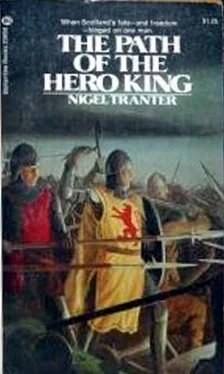That is the cotised bend between six lions, white on blue, of Bohun, is it not? Hereford. The High Constable.
But… he would never lead so small a band.
There are three mullets in chief, Sire. A second son, perhaps.
But, Your Grace-this is folly! To hazard yourself thus. To give battle. On … on a gar ron Unarmed! If you were to fall, now, all is lost before it is begun …!
Never fear, Willie! This is scarce giving battle. We but coax and draw and cozen. And this gar ron can outrun the heavier English beasts. And I am not unarmed. He drew out a light battle-axe from its socket at his saddle.
Hereford has no son. That must be his nephew, Sir Henry de Bohun. See-get back to the others. Tell them to wheel and sidestep. A melee. No true battle, but a melee. Go-quickly.
The enemy were less than 300 yards away now, their knightly leader and his esquire with the banner somewhat in front-a young man by his manner of riding. Pray that he was inexperienced.
Bruce was still moving forward, at a slow trot, vigilant, calculating.
This must be timed to a nicety … Then, suddenly, unexpectedly, the entire situation changed.
That young knight had sharp eyes, it seemed, quick wits, and a lofty ambition. Even at 200 yards he must have spotted the gold crown that circled the Kings basinet-the sun would be gleaming on it. Clearly his shouts rang out The Bruce! It is the Bruce! Himself! Then he was turning in his saddle, waving back his ranks.
He is mine! Mine! Back! Back, I say! And couching his long lance,
he stooped low, digging in his golden spurs.
A Bohun! A Bohun! he yelled, as he thundered forward, alone.
Bruce caught his breath, taken by surprise. Here was a fix! Folly indeed. For both of them. To dodge and wheel and bolt now, before this open challenge to single combat, was inconceivable for the King of Scots. Yet he was under mOunted and under-armed, without lance or even sword-these left with his heavy charger up on the hill. He had only this light battle-axe and a dirk. Yet he had no choice but to stand or be for ever shamed. Irvine had been right. If he fell now, all was lost. This-this was worthy of his brother Edward!
There were only moments for racing thoughts. Grimly the King reminded himself that he was the veteran, the man of experience, his nerve tried in a hundred frays. He had other advantages-a more nimble horse, and a notable reputation with the battle-axe.
He altered nothing, therefore, as the other hurtled down on him.
He did not draw aside, crouch, or even change his mounts quiet trot. Above all, he did not pull up-for a horse can much more swiftly answer the rein and knee when already in movement, than when halted.
It might so well have been a tournament, under the afternoon sun-save that one jouster had no lance. Now only a few yards separated them, and eye looked into hot eye. Bruce made his only disposition. Suddenly he tossed the battle-axe from his right hand to his left.
The Bohun saw it, and in the split seconds left to him, adjusted accordingly. It could only mean that his opponent was going to pull to his right, to the left of himself, and so any blow would have to be left-handed. He therefore swung his lance just a few degrees to his own left.
With only feet to spare, Bruce jerked and kicked his gar ron to the left, not the right, directly across the front of the galloping charger, causing it to veer and peck. In almost the same movement he flung his axe back into his right hand.
Only by bare inches was a collision avoided. But the lance-tip, swinging round wildly at the last moment to the other side, did not come within a foot of Bruces shoulder. And as the other plunged past, bent low over his couched lance, the King rose higher in his stirrups, reaching up, and brought down that battle-axe right on the crown of the Bohuns crested helm, with all the violent strength of a mighty spring released.
With the deep crunching of shorn steel and bone both, the gleaming blade drove down and down, splitting the head open, in spouting blood, to the very breastbone and gorget, where it was jerked to such an abrupt stop that the wooden shaft snapped off in its wielders hand. Charger and reeling, ghastly rider careered on until Bohun fell with a resounding crash.
The victor, his gar ron still trotting forward, was left with a foot or so of splintered timber and a wrist and arm numb with the shock. He had scarcely realised the power of that right arm, recent sickness or none.
The enemy line was still halted, under Bohuns esquire, so swiftly left leaderless. There were shouts from behind Bruce as his 200, ignoring previous commands, surged forward for the King.
The uncertainty, now, of Bohuns line, still 250 yards away, and stationary, was very evident, hesitating whether to resume the spoiled charge, stand still, or retire. Their doubts could only have been advanced by activity behind as well as in front. Trumpets sounded from the main English van, and some part of it at least began to move forward. At the same time, renewed shouting from still farther in front heralded the return to the fray of the 100 lame ducks. Bohuns esquire did what any sensible man would have done-nothing. He waited.
Bruce again was faced with decision. It would be suicide to confront the entire English van, with his 300. But by turning back, he still might be able to lead the enemy into his pits … Then there was a new development, intimated by new trumpet blowing from the right flank, from the Tor Wood. Down through the glades came Edward Bruce, to the rescue of his brother, with some 500 horse. The King almost wept. Everything was forcing him into battle, the wrong battle. Yet he could scarcely blame Edward.
It was with relief, therefore, that he perceived that only a small proportion of the English van was in fact advancing to the aid of the Bohun company-even though they did so under the ken speckle banner of Gloucester himself. Hereford, the veteran, was holding the main host back. Those trenches and pits were still to be unused.
With Edward now charging down on the right, there could be no real choice for the King. He had to go forward, into the attack-and hope that it could indeed be a limited engagement.
All would depend on Hereford.
Caught up by his own 300 now, Bruce rode straight for Bohuns waiting line, useless axe-shaft in hand. With a crash they met, and, since the English were in only two ranks, plunged through, on impetus rather than fighting, and little of casualties on either side.
There was Gloucester, with perhaps another 500, not far ahead.
That Earl was a young man, barely twenty-four, and though gallant
unused to battle. Seeing the King of Scots un halted in hit advance directly in front, and a new and large force charging down on his left flank, he did not panic, but sought to change his dispositions -not easy in a headlong cavalry attack. While retaining half his men to confront the King, he sought to swing the other half round to face Edward Bruces assault It was not entirely successful as a manoeuvre and his whole force lost vital speed.
In the event, the result was complete chaos, on both sides, with mounted men crashing into each other, milling, falling, and no coherence or control anywhere, the sort of battle commanders suffer in nightmares. Gloucester himself was one of the first to be unhorsed. But any advantage was with the Scots, since they retained the impetus. In a whirling impenetrable melee, the clash moved south-eastwards. The English were not in fact defeated-but it looked as though they were.
In the confusion, two trends in the leaders thinking had their inevitable effect on the struggle. Bruce did not want to get drawn within striking distance of Herefords main van; and Gloucester desired to get back to that same van. As a consequence, both sides tended, almost imperceptibly, to draw back. Only Edward Bruce would have reversed the process-but his brother reached his side, and made his wishes known in no uncertain tones. He in fact ordered Edwards trumpeter to sound the retiral.
Читать дальше












